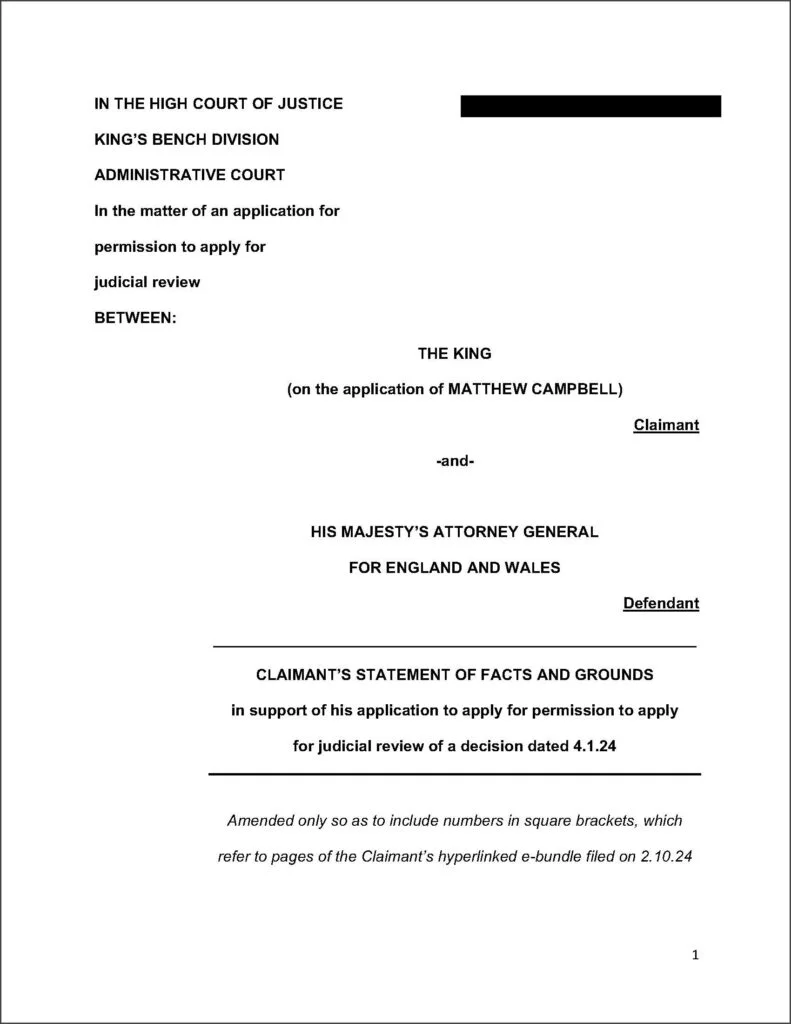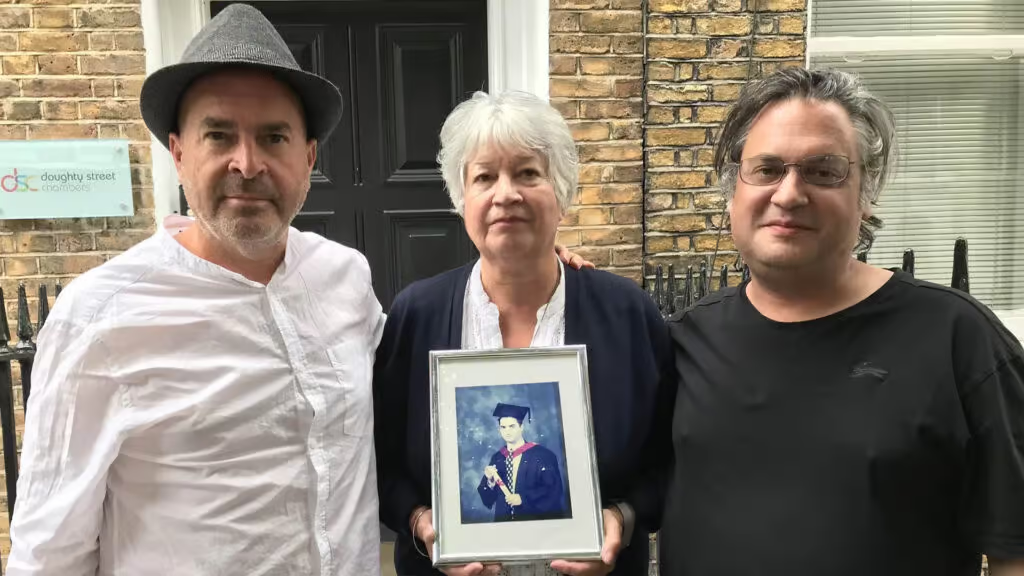The family of Geoff Campbell, a 31-year-old British citizen who was killed in the North Tower of the World Trade Center on 9/11, today took the first step toward legally challenging the January 2024 decision issued by Britain’s previous attorney general, Victoria Prentis, to deny a new inquest into their loved one’s death.
After initially filing their case with the High Court in April, the family completed the filing by submitting some 9,000 pages of supporting documents earlier today.
The family’s goal in seeking a new inquest is to establish that Geoff Campbell’s death was caused by the North Tower being brought down with explosives. The original conclusion, reached by West London Coroner Alison Thompson at the first inquest in 2013, stated that the building collapsed due to the impact of American Airlines Flight 11.
“For more than a decade my family has had to live knowing that the official cause of death for my brother Geoff is wrong,” remarked Matt Campbell after the filing. “The attorney general’s actions over the past three years have only prolonged our wait for a real investigation, but I am confident that today will be a turning point in our quest for truth.”
The Campbells were able to bring their case thanks to the generous support of hundreds of people around the world, to whom the family and we at the International Center for 9/11 Justice are immensely grateful.
The path ahead
Attorney General Richard Hermer, who was appointed following the Labor Party’s victory in the July general election, now has until Friday, October 25, to file what is called an “acknowledgment of service,” which must include detailed “summary grounds” responding to the arguments made in the family’s “statement of facts and grounds.”
The Campbells believe their case is so strong that they are very hopeful Hermer will withdraw his predecessor’s decision before the judicial review process goes any further. This would potentially pave the way for Hermer to issue a new decision allowing the inquest to go forward.
However, should Hermer elect to defend the decision, the High Court would first rule on whether to grant permission to the family to apply for judicial review. The question before the court at the “permission stage” of a judicial review proceeding is whether “there is an arguable ground for judicial review which has a realistic prospect of success.”

Permission in this particular case could hinge on the unsettled matter of whether decisions issued by the attorney general can be judicially reviewed by the courts. Case law from 1978 says that attorney general decisions are not judicially reviewable, but more recent case law has suggested that unlawful decisions by the attorney general should not be beyond the power of the courts to review.
If the High Court grants permission, the case would proceed to a “substantive hearing.” It would be decided either at that hearing or, more likely, within the next few months.
If the Campbells prevail at that stage, the High Court would quash the former AG’s decision and order Attorney General Hermer to make a new one. In that scenario, the new decision would likely be positive, since it would be highly unlikely for the attorney general to reject the family’s application again after Prentis withdrew her first decision in 2023 and after her second decision was quashed.
Should the High Court either refuse judicial review at the “permission stage” or dismiss the case at the “substantive hearing,” the Campbell family would have the right to appeal.
At any point in the process, Hermer can withdraw the decision and issue a new one. This is the outcome the Campbells are aiming for, since they believe it will be impossible for Hermer to put forth a credible defense of Prentis’ decision.
For a comprehensive explanation of the judicial review process in England and Wales, see the “The Administrative Court Judicial Review Guide 2023.”
The case against Prentis’ decision
The family’s case against the attorney general’s decision is based on several grounds. These include:
- failure to apply the correct legal test,
- unreasonable rejection of the “insufficiency of inquiry” ground of the original application,
- failure to give adequate reasoning for the wholesale rejection of the new evidence,
- unreasonable assertion of a “clear consensus view” regarding the cause of the North Tower’s collapse, and
- unreasonable categorization of the family’s hypothesis as “fanciful.”
The first ground relates to Prentis applying two legal tests that the family contends have no basis in law, thereby improperly raising the very low threshold for how strong any new evidence must be to warrant opening a new inquest.
The first unlawful test was to require that the new evidence submitted by the family would “make a meaningful difference to the verdict.” The other was to require a “realistic possibility of a different conclusion.” The family argues that the first test was completely unfounded while the second test erroneously added the word “realistic” to the proper legal test.
The second ground relates to Prentis’ claim — made in response to the family’s claim that there was an “insufficiency of inquiry” at the first inquest — that it was acceptable for West London Coroner Alison Thompson to rely on the evidence given by the Metropolitan Police in concluding that the North Tower’s collapse was caused by the impact of American Airlines Flight 11.
The family contends that Prentis’ claim was unreasonable (and therefore unlawful) because the evidence given by the Metropolitan Police — and the US government investigations upon which that evidence was based — contained no analysis of the cause of the North Tower’s collapse. Therefore, they argue, because it is unlawful for coroners to enter a conclusion when they have heard no evidence supporting it, Prentis’ defense of the coroner’s investigative process is simply irrational.
The latter three grounds relate to how the attorney general summarily dismissed the 2,500 pages of new evidence submitted by the family in August 2021.

According to the family’s filing, Prentis’ cursory dismissal of the new evidence involved the total failure to provide adequate reasoning for rejecting it — a breach that is plainly contrary to law. It also involved, according to the filing, her demonstrably unreasonable assertion that there is a “clear consensus” in favor of the airplane impacts causing the Twin Towers’ collapse and her equally unreasonable assertion that the family’s hypothesis of explosives bringing down the towers is “fanciful.”
“It is obvious to anyone who reads the decision that Victoria Prentis and her office did not engage in a good faith review of our application,” said Mr. Campbell. “Her decision must not be allowed to stand, or else the law meant to guarantee bereaving families a real inquiry into the death of their loved ones is utterly meaningless.”
Within three weeks, the Campbell family will learn whether the new attorney general will attempt to defend his predecessor’s decision under the scrutinizing eye of the High Court or whether he will withdraw the decision and potentially allow Geoff Campbell’s new inquest to go forward.



